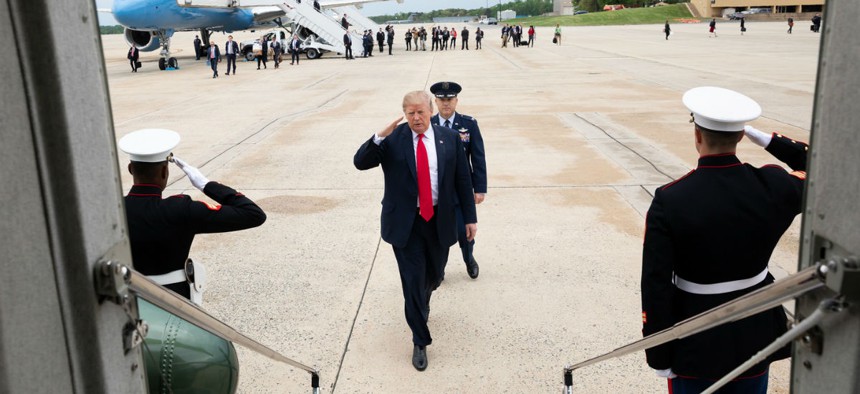
President Trump boards Marine One at Joint Base Andrews on May 5. Official White House Photo by Andrea Hanks
Trump’s Rescission Package Would Save Far Less Than White House Claims, CBO Says
USDA, HHS, Transportation and Treasury would be the hardest hit agencies.
President Trump’s proposed package to revoke federal spending would save only $1 billion in actual outlays over the next 10 years, according to a new estimate from the Congressional Budget Office, just 6 percent of the total cuts put forward in the plan.
The White House has boasted the rescissions would slash $15 billion, but CBO found the actual savings would be mitigated because the targeted funding stems largely from unspent money and appropriations that are no longer necessary for agencies. Administration officials have gloated the rescission package is the largest ever proposed by a president at one time.
They have also conceded the proposed revocations largely identified “unallocated balances in accounts that haven’t been spent.” In some cases, the White House has said, federal agencies are no longer permitted to spend the money if they wanted to do so. The package would block $7 billion in spending on the Children’s Health Insurance Program, for example, but congressional Republicans and Trump administration officials have said the money was allocated to inactive accounts or otherwise obsolete funds.
CBO’s estimate came in lower than the Office of Management and Budget’s own calculation that the package would reduce outlays by $3 billion. The legislative branch agency said it examined historical spending patterns and found much of the money the White House said should be rescinded would not have been spent anyway. Other parts of the package would claw back money unlikely to be spent because agencies no longer needed it for the purpose for which it was allocated, CBO said.
Various programs in the departments of Agriculture, Health and Human Services, Transportation and Treasury would face the hardest hits in actual spending cuts, CBO estimated. The agencies would absorb the cuts disproportionately in fiscal 2019, before gradually lessening until 2028.
The Energy Department, meanwhile, would face the largest rescission—a $4.1 billion cut to its Advanced Technology Vehicle Manufacturing loan program—but none of it would affect actual outlays.
The Committee for a Responsible Federal Budget said even a rescission of money that never would have been spent is valuable because it prevents appropriators from future “budget gimmicks” in which they could cite the unspent funding to offset new spending. OMB Director Mick Mulvaney said the package was an “obvious step” toward reducing unnecessary spending and would help decrease the national debt.
“A $15 billion rescission package isn’t going to fix the debt, but it’s a start,” CRFB President Maya MacGuineas said. “Today’s specific rescission package will have little effect on the budget deficit since the proposed cuts are relatively small and most are to funds that will never be spent anyway. But every little bit helps, and getting in the habit of supporting spending cuts without putting the money toward new policies is a step in the right direction.”
The future of the rescission package is unclear. The measure only needs a simple majority in both houses of Congress, but Politico has reported that some senior Republican appropriators are resisting the proposal. If Democrats unite against the bill, and Sen. John McCain, R-Ariz., remains sidelined as he battles cancer, Republicans cannot afford to lose a single vote from their caucus in the upper chamber.







